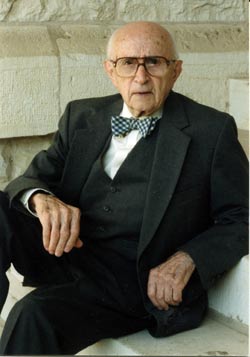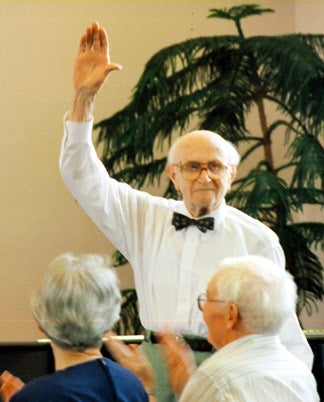
With deep sadness Conrad Grebel University College mourns the loss of founding president, Joseph Winfield Fretz, 94, who passed away peacefully on January 24, 2005, after a brief illness at Kidron-Bethel Retirement Center in North Newton, Kansas.
Winfield, Marguerite and their family came to Waterloo in 1963 from Bethel College in Newton, Kansas where Fretz had been a Professor of Sociology for 21 years (1942-1963). Fretz served as Founding President of Conrad Grebel College for 10 years, until 1973. He continued teaching Sociology until his retirement in 1979 when he and Marguerite returned to Newton. She predeceased him in March 2002. Fretz was a graduate of Bluffton College, Bluffton, Ohio, and received a Bachelor of Divinity at Chicago Theological Seminary, and MA and PhD degrees in Sociology at the University of Chicago.
When Fretz was invited to become president of Conrad Grebel, the college was still more of a dream than a reality. However, under his guidance, a faculty was hired, a building was constructed, students were recruited, and the dream was realized. Conrad Grebel College became the fourth of four affiliated denominational colleges at the University of Waterloo.
One of Fretz's greatest challenges as Conrad Grebel president was to establish his long-held ideal of Christian community, to have a truly Anabaptist-Mennonite college on a secular university campus and to select students who were sympathetic to that ideal and who would be good witnesses to their faith.
I felt that it would be especially wonderful for Mennonite people who had emphasized ethical, moral living to try to that on a university campus. I felt that Waterloo University would be a very interesting place to test how strong our religious convictions are and whether we are able to give the kind of witness we have always talked about,

Looking back after 40 years, Fretz said that three important decisions shaped Grebel. When he first saw the architectural plans for the residence building, he “couldn’t abide by it” so the architect changed the roofline into a saw-tooth design. Fretz
really rejoiced in that roofline. It is so much more attractive and aesthetic.
The round tables in the dining room were also a result of extensive discussion.
Round tables, rather than square, allow all people, whether it is 2, 3, 4, 5, or 6, to face each other directly. It is a very natural source of discourse, and it contributes to social graces and interaction,
said Fretz.
The third important decision was to hire conservative Mennonite women in the kitchen. These excellent cooks have maintained Grebel’s reputation as the best place to eat on campus to this day. Fretz believed that
the family style meals were more welcoming and integrating.
Upon his retirement in 1979, Fretz was appointed Professor Emeritus of Conrad Grebel. In 1983, on the occasion of the twenty-fifth anniversary of the University of Waterloo, he was awarded an honorary Doctor of Laws degree
in recognition of his distinguished service as educator, scholar, administrator and humanitarian.
He also authored numerous publications and several books on Mennonites.
Grebel was fortunate to have Fretz and son Tom attend the college’s 40th anniversary alumni reunion in August 2003 (pictured on the right). He enjoyed that opportunity to reconnect with former students, faculty and staff immensely.
Conrad Grebel University College has planned a memorial service for Thursday, February 3 at 12:30pm in Grebel's Chapel.
A memorial service will be held at 4:00pm on Saturday February 12, at the Bethel College Mennonite Church, North Newton, Kansas
In lieu of flowers, memorial contributions may be made to one of the following:
Mennonite Central Committee,
21 S. 12th St, Box 500, Akron, PA, 17501
or to the
Burton D. Fretz Memorial Fund,
National Senior Citizens Law Center,
Suite 400, 1101 14th St. N.W, Washington DC 20005.
This fund was established in 2002 to honor Dr. Fretz’s eldest son and to support Burton’s life work of promoting the rights of older Americans throughout the country. Burton, an attorney, headed the center for 20 years prior to his death in 2001, and the organization successfully carries on his work.